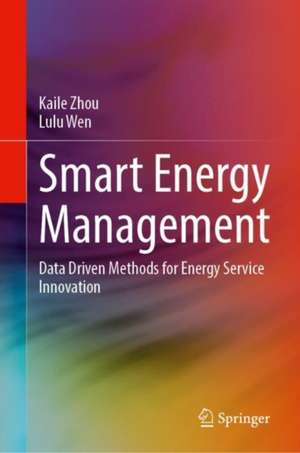Smart Energy Management: Data Driven Methods for Energy Service Innovation
Autor Kaile Zhou, Lulu Wenen Limba Engleză Hardback – 5 feb 2022
| Toate formatele și edițiile | Preț | Express |
|---|---|---|
| Paperback (1) | 698.30 lei 6-8 săpt. | |
| Springer Nature Singapore – 6 feb 2023 | 698.30 lei 6-8 săpt. | |
| Hardback (1) | 704.69 lei 6-8 săpt. | |
| Springer Nature Singapore – 5 feb 2022 | 704.69 lei 6-8 săpt. |
Preț: 704.69 lei
Preț vechi: 829.04 lei
-15% Nou
Puncte Express: 1057
Preț estimativ în valută:
134.84€ • 141.07$ • 112.01£
134.84€ • 141.07$ • 112.01£
Carte tipărită la comandă
Livrare economică 03-17 aprilie
Preluare comenzi: 021 569.72.76
Specificații
ISBN-13: 9789811693595
ISBN-10: 9811693595
Pagini: 310
Ilustrații: XV, 310 p. 130 illus., 122 illus. in color.
Dimensiuni: 155 x 235 mm
Greutate: 0.64 kg
Ediția:1st ed. 2022
Editura: Springer Nature Singapore
Colecția Springer
Locul publicării:Singapore, Singapore
ISBN-10: 9811693595
Pagini: 310
Ilustrații: XV, 310 p. 130 illus., 122 illus. in color.
Dimensiuni: 155 x 235 mm
Greutate: 0.64 kg
Ediția:1st ed. 2022
Editura: Springer Nature Singapore
Colecția Springer
Locul publicării:Singapore, Singapore
Cuprins
Chapter 1 Introduction.- Chapter 2 Residential Electricity Consumption Pattern Mining based on Fuzzy Clustering.- Chapter 3 Load Profiling Considering Shape Similarity using Shape-based Clustering.- Chapter 4 Load Classification and Driven Factors Identification based on Ensemble Clustering.- Chapter 5 Power Demand and Probability Density Forecasting based on Deep Learning.- Chapter 6 Load Forecasting of Residential Buildings based on Deep Learning.- Chapter 7 Incentive-based Demand Response with Deep Learning and Reinforcement Learning.- Chapter 8 Residential Electricity Pricing based on Multi-Agent Simulation.- Chapter 9 Integrated Energy Services based on Integrated Demand Response.- Chapter 10 Electric Vehicle Charging Scheduling Considering Different Charging Demands.- Chapter 11 P2P Electricity Trading Pricing in Energy Blockchain Environment.- Chapter 12 Credit-Based P2P Electricity Trading in Energy Blockchain Environment.
Notă biografică
Kaile Zhou received his B.S. degree and Ph.D. degrees from Hefei University of Technology, Hefei, China in 2010 and 2014 respectively. He was a visiting scholar at the University of Arizona, Tucson, AZ, USA, and a Postdoctoral Research Fellow at the City University of Hong Kong, Hong Kong SAR, China. He is now Professor of Management Science and Engineering at Hefei University of Technology. His research interests include energy system optimization, integrated energy services, and data-driven decision-making.
Lulu Wen received his B.S. degree from the School of Transportation and Management, Dalian Maritime University, Dalian, China in 2016, and the Ph.D. degree from the School of Management, Hefei University of Technology, Hefei, China in 2021. He was a visiting scholar at the Lawrence Berkeley National Laboratory from 2019 to 2020. He is now an engineer at Hithink RoyalFlush Information Network Co., Ltd., Hangzhou, China. His current research interests include big data analytics and smart energy management.
Lulu Wen received his B.S. degree from the School of Transportation and Management, Dalian Maritime University, Dalian, China in 2016, and the Ph.D. degree from the School of Management, Hefei University of Technology, Hefei, China in 2021. He was a visiting scholar at the Lawrence Berkeley National Laboratory from 2019 to 2020. He is now an engineer at Hithink RoyalFlush Information Network Co., Ltd., Hangzhou, China. His current research interests include big data analytics and smart energy management.
Textul de pe ultima copertă
This book provides a relatively whole view of data-driven decision-making methods for energy service innovation and energy system optimization. Through personalized energy services provision and energy efficiency improvement, the book can contribute to the green transformation of energy system and the sustainable development of the society. The book gives a new way to achieve smart energy management, based on various data mining and machine learning methods, including fuzzy clustering, shape-based clustering, ensemble clustering, deep learning, and reinforcement learning. The applications of these data-driven methods in improving energy efficiency and supporting energy service innovation are presented. Moreover, this book also investigates the role of blockchain in supporting peer-to-peer (P2P) electricity trading innovation, thus supporting smart energy management. The general scope of this book mainly includes load clustering, load forecasting, price-based demand response, incentive-based demand response, and energy blockchain-based electricity trading. The intended readership of the book includes researchers and engineers in related areas, graduate and undergraduate students in university, and some other general interested audience. The important features of the book are: (1) it introduces various data-driven methods for achieving different smart energy management tasks; (2) it investigates the role of data-driven methods in supporting various energy service innovation; and (3) it explores energy blockchain in P2P electricity trading, and thus supporting smart energy management.
Caracteristici
Introduces different data-driven methods for achieving smart energy management Investigates the role of data-driven methods in supporting energy service innovation Illustrates the new P2P electricity trading based on energy blockchain
